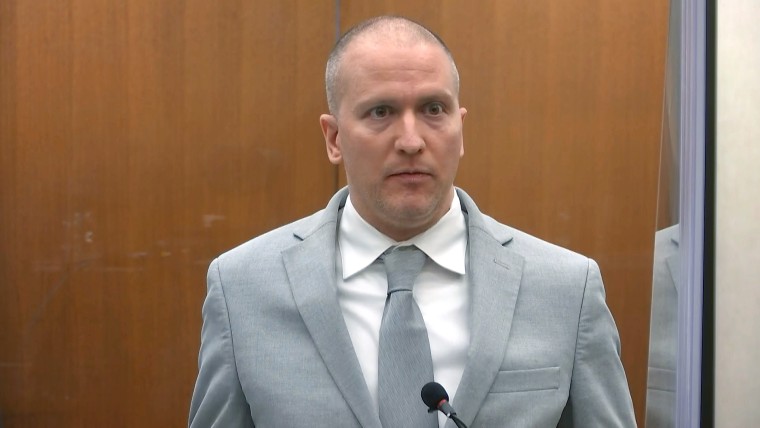A lawyer for Derek Chauvin asked an appeals court Wednesday to throw out the former Minneapolis police officer’s convictions for the killing of George Floyd, arguing that legal and procedural errors deprived him of a fair trial.
Floyd died on May 25, 2020, after Chauvin, who is white, pinned the black man to the ground with his knee to the neck for nine and a half minutes. Video from a bystander captured Floyd’s fading cries of «I can’t breathe.» Floyd’s death sparked protests around the world and forced a national recognition of police brutality and racism.
Chauvin’s attorney, William Mohrman, told a three-judge panel of the Minnesota Court of Appeals that the trial judge should have moved the case out of Minneapolis due to extensive pretrial publicity and security precautions. unprecedented due to protest fears.
“The main issue in this appeal is whether a criminal defendant can get a fair trial in accordance with constitutional requirements in a courthouse surrounded by concrete blocks, barbed wire, two armored personnel carriers, and a squad of US Army troops. National Guard, all of whom are there for one purpose: in the event the defendant is acquitted by the jury,» Mohrman said.
But Neal Katyal, a special counsel for the state, said Chauvin got “one of the most transparent and comprehensive trials in our nation’s history. … Chauvin’s many arguments before this court do not come close to justifying the revocation.»
Hennepin County Judge Peter Cahill sentenced Chauvin to 22 1/2 years after the jury found him guilty of second-degree murder, third-degree murder and second-degree manslaughter. Chauvin later pleaded guilty to a separate federal civil rights charge and was sentenced to 21 years in federal prison, which he is now serving in Arizona concurrently with his state sentence.
«Judge Cahill handled this trial with great care, and even if Chauvin could identify any minor flaws, any errors are harmless,» Katyal said. «The evidence of Chauvin’s guilt was captured on video for the world to see.»
Appeals Judge Peter Reyes said Wednesday that the court would rule within 90 days. Chauvin did not attend oral arguments, but Minnesota Attorney General Keith Ellison, who assembled the prosecution team, sat in the front row.
Even if Chauvin wins his appeal, his federal sentence will keep him in prison longer than his state sentence likely would because he would qualify for parole sooner in the state system.

Mike Brandt, a Minneapolis defense attorney who has been following the cases stemming from Floyd’s murder, said an appeal victory «would have no functional significance» and that Chauvin’s time in prison is «quite set in stone» given his federal sentence.
Mohrman often pursues conservative causesincluding challenges to President Joe Biden’s election victory and COVID-19 vaccine mandates.
Mohrman argued in his brief that the pretrial publicity was more extensive than any trial in Minnesota history, and that the judge should have adjourned the trial and sequestered the jury. Mohrman wrote that the publicity and riots, the city’s $27 million settlement with Floyd’s family announced during jury selection, the riots over a police killing in a Minneapolis suburb during jury selection, and the closing of the court were just some of the factors. hurting Chauvin’s chance of a fair trial.
Much of Wednesday’s questioning focused on a juror who participated in a civil rights event commemorating the Dr. Martin Luther King, Jr. March on Washington a few months after Floyd’s death. Only after the trial did the jury reveal that he had been there.
He was questioned during jury selection about whether he had participated in any demonstrations or marches «in Minneapolis» against police brutality after Floyd’s death. But Chauvin’s original attorney, Eric Nelson, did not ask if he had participated in any marches elsewhere.
Mohrman argued that Cahill should have held a post-disclosure hearing to determine whether the jury’s non-disclosure constituted misconduct. She said the appeals court should send the case back to Cahill for a hearing on that issue, a request Cahill had denied.
Reyes said judges have «pretty broad discretion» in conducting trials, and that Nelson questioned the jury and could have punched them, but didn’t. Reyes said case law puts the burden of asking the right questions on the defense.
Katyal told the judges that the jury accurately answered the questions and repeatedly insisted that they could return an impartial verdict. She said the defense failed to use three of her peremptory attacks, which she called an indication of satisfaction with the jury.
In their brief, prosecutors said pretrial publicity had covered up the state making a change of trial venue futile. They also said Cahill took steps to protect jurors from outside influences so there was no need to isolate them before deliberations.
Other disputes on appeal include whether it was legally allowed to convict Chauvin of third degree murder, and whether Cahill was justified in exceeding the recommended 12 1/2 years under the state’s sentencing guidelines.

